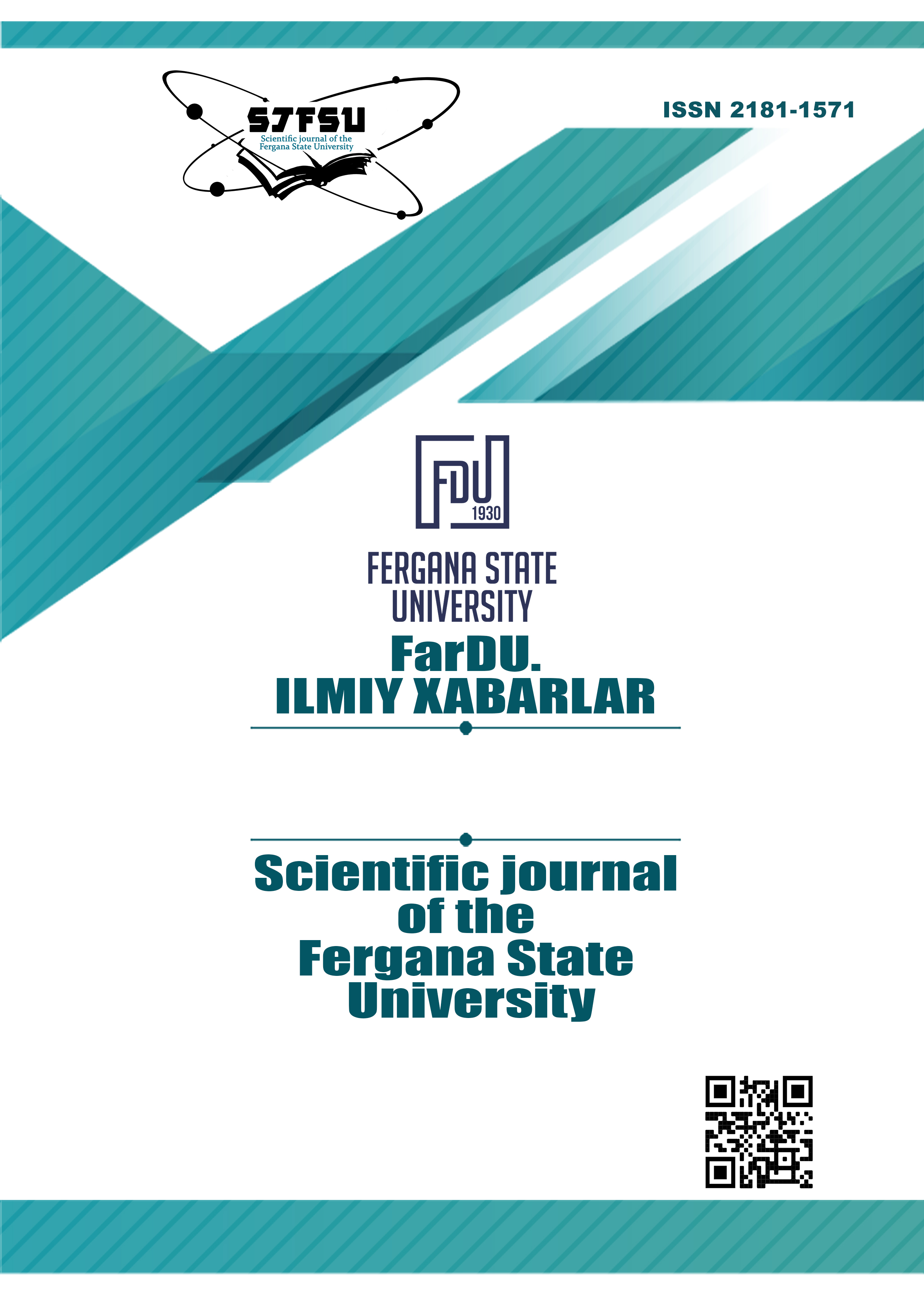THE INFLUENCE OF THE STYLE OF THINKING AND THE IDEOLOGICAL SYSTEM OF THE SOCIETY ON THE SOCIAL DEVELOPMENT
Keywords:
thinking, ideology, system, social determinism, moral conservatism, devolopment, progress, social values.Abstract
The purpose of the study is to substantiate the mechanism of the influence of social ideology on the effectiveness of managing the social development of society. In the process of achieving this goal, the following tasks were solved: The essence of modern ideologies is studied. The importance of social ideology for managing the social development of society is substantiated. A mechanism for the influence of social ideology on the effectiveness of managing the social development of society has been formed. In this regard, it is important to conduct a special study to determine the nature of the influence of social ideology on the effectiveness of managing the social development of society. In the research process, methods of a non-linear, systematic approach of synergetics were used, as well as general scientific research methods, such as analysis, synthesis, logic, etc. The results of the study show that the effectiveness of managing the social development of a society depends on a number of factors, including social ideology, social culture, social activity of the state, social economy, strategic development of society, social system and coordination of interests of the state and society. The implementation of the solution allows creating the necessary conditions for the social development of society. This is fundamentally important, since social (economic and political) development in combination with global (domestic and foreign economic) development determines the correctness and quality of sustainable development, and the result is an increase in the standard of living of the population. In order to understand the logic of the influence of social ideology on the effectiveness of managing the social development of society, a study was conducted on the nature of the main modern ideologies developed in the 20th century. The results obtained led to the conclusion that social determinism, acting in conjunction with the ideologies of moral conservatism and economic dynamism, has a significant impact on the effectiveness of managing the social development of society.
References
Василькова В.В Порядок и хаос в развитии социальных систем. С.Пб. 1999 г. С 483
Карл Поппер. Открытое общество и его враги. М., 1992г. С. 84
Киселов Г.С Свобода и эволюция. Вопросы философии. 2005г №10 С14
Моисеев, Н. Н. Современный рационализм и мировоззренческие парадигмы // Общественные науки и современность. – 1994. – № 3. – С. 77–87.
Муминова З.О. Маънавий борлиқнинг синергетик таҳлили. – Самарқанд: Зарафшон, 2016. – 204 б.
Муминова З.О. Атрибутивные свойства духовного мира человека // Universum: Общественные науки. - Москва: 2014. №3.
Муминова З.О. Свобода – одно из неотъемлемых свойств духовного мира человека // Self-realization of potential of a personality in modern society. Prague. 2014.
Муминова З.О.Синергетический анализ духовного бытия человека // Credo new. – Санкт-Питербург: 2015. №2
Muminova Z.O. Factors that forms human beyings moral beying // The USA journal of applied sciences. NY.2015. №2.
Muminova Z.O. Spiritual moral beying of humans in the sinergetik context // Austrian journal of humanities and social sciences. 2015/№3.
Muminova Z.O. Objective and subjective factors that forms humans moral beying // Theoritical and applied science. Philadelphiya, USA. 2016. №2
Пригожин, И. Философия нестабильности // Вопросы философии. – 1991. – № 6. С. 46–57
Урманцев Н. М. Cвобода общество и человека: аспекты самоорганизации. Философия и общество, № 4, октябрь – декабрь 2007 68–82.
Янч, Э. Самоорганизующаяся Вселенная. Введение и обзор: рождение парадигмы из метафлуктуации // Общественные науки и современность. – 1991. – № 1. – С. 143–158.
Downloads
Published
Issue
Section
License
Copyright (c) 2023 Scientific journal of the Fergana State University

This work is licensed under a Creative Commons Attribution-NonCommercial-NoDerivatives 4.0 International License.
How to Cite
Most read articles by the same author(s)
- , ON THE USE OF SOME PERSIAN PHRAZEOLOGICAL UNITS IN THE UZBEK LANGUAGE , Scientific journal of the Fergana State University: No. 1 (2022): Scientific journal of the Fergana State University
- , ABOUT LEXICO-SEMANTIC CHARACTERISTICS OF SOME PERSIAN COMPOUND WORDS IN “SADDI ISKANDARI” BY ALISHER NAVOI , Scientific journal of the Fergana State University: No. 2 (2023): Scientific journal of the Fergana State University (Social humanities sciences)
- , , TROPHIC RELATIONSHIP OF COCCINELLID BEETLES (COLEPTERA: COCCINELLIDAE) , Scientific journal of the Fergana State University: No. 3 (2024): FarDU.Ilmiy xabarlar jurnali. Ilova to'plam (Aniq va tabiiy fanlar)
- , ABOUT LEXEMAS RELATED TO THE BASICS “ZAR” AND “ZARRA” IN THE NAVOI EPIC “SADDI ISKANDARI” , Scientific journal of the Fergana State University: No. 5 (2024): Scientific journal of the Fergana State University (Social humanities sciences)
- , , ABOUT THE PERSIAN-TAJIK WORDS AND PERSIAN IZAFET CONSTRUCTIONS IN NAVOI’S EPIC “SADDI ISKANDARI” , Scientific journal of the Fergana State University: No. 3 (2024): FarDU.Ilmiy xabarlar jurnali. Ilova to'plam (Aniq va tabiiy fanlar)
- , ABOUT PERSIAN SYNONYMS IN THE NAVOI EPIC “SADDI ISKANDARI" , Scientific journal of the Fergana State University: No. 1 (2024): Scientific journal of the Fergana State University (Social humanities sciences)
- , ABOUT LEXEMES RELATED TO THE TERMS “GANJ” AND “GAVKHAR” IN THE NAVOI EPIC “SADDI ISKANDARI” , Scientific journal of the Fergana State University: No. 3 (2024): FarDU.Ilmiy xabarlar jurnali. Ilova to'plam (Aniq va tabiiy fanlar)
- , , ON THE RELATIONSHIP OF THE UZBEK LANGUAGE WITH THE PERSIAN LANGUAGE , Scientific journal of the Fergana State University: No. 1 (2024): Scientific journal of the Fergana State University (Social humanities sciences)
- , ABOUT LEXICO-SEMANTIC CHARACTERISTICS OF SOME PERSIAN COMPOUND WORDS IN “SADDI ISKANDARI” BY ALISHER NAVOI , Scientific journal of the Fergana State University: No. 3 (2023): Scientific journal of the Fergana State University (Social humanities sciences)
- Zarifa Alimova, SEMANTIC GROUPING OF PERSIAN-TAJIK WORDS IN NAVOYI’S “SADDI ISKANDARIY” , Scientific journal of the Fergana State University: No. 1 (2023): Scientific journal of the Fergana State University (Social humanities sciences)

